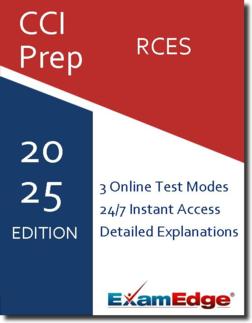CCI RCES (RCES) Practice Tests & Test Prep by Exam Edge - Topics
Based on 37 Reviews
- Real Exam Simulation: Timed questions and matching content build comfort for your CCI RCES test day.
- Instant, 24/7 Access: Web-based CCI Registered Cardiac Electrophysiology Specialist practice exams with no software needed.
- Clear Explanations: Step-by-step answers and explanations for your CCI exam to strengthen understanding.
- Boosted Confidence: Reduces anxiety and improves test-taking skills to ace your CCI Registered Cardiac Electrophysiology Specialist (RCES).

Understanding the exact breakdown of the CCI Registered Cardiac Electrophysiology Specialist test will help you know what to expect and how to most effectively prepare. The CCI Registered Cardiac Electrophysiology Specialist has 130 multiple-choice questions The exam will be broken down into the sections below:
| CCI Registered Cardiac Electrophysiology Specialist Exam Blueprint | ||
|---|---|---|
| Domain Name | % | Number of Questions |
| Conducting Pre-Procedural Activities | 11% | 14 |
| Conducting Intra-procedural Activities | 22% | 28 |
| Conducting Post-Procedural Activities | 3% | 4 |
| Performing Diagnostic Studies | 28% | 36 |
| Performing Therapeutic Procedures | 33% | 42 |
| Communicating With Patients and the Health Care Team | 4% | 5 |


